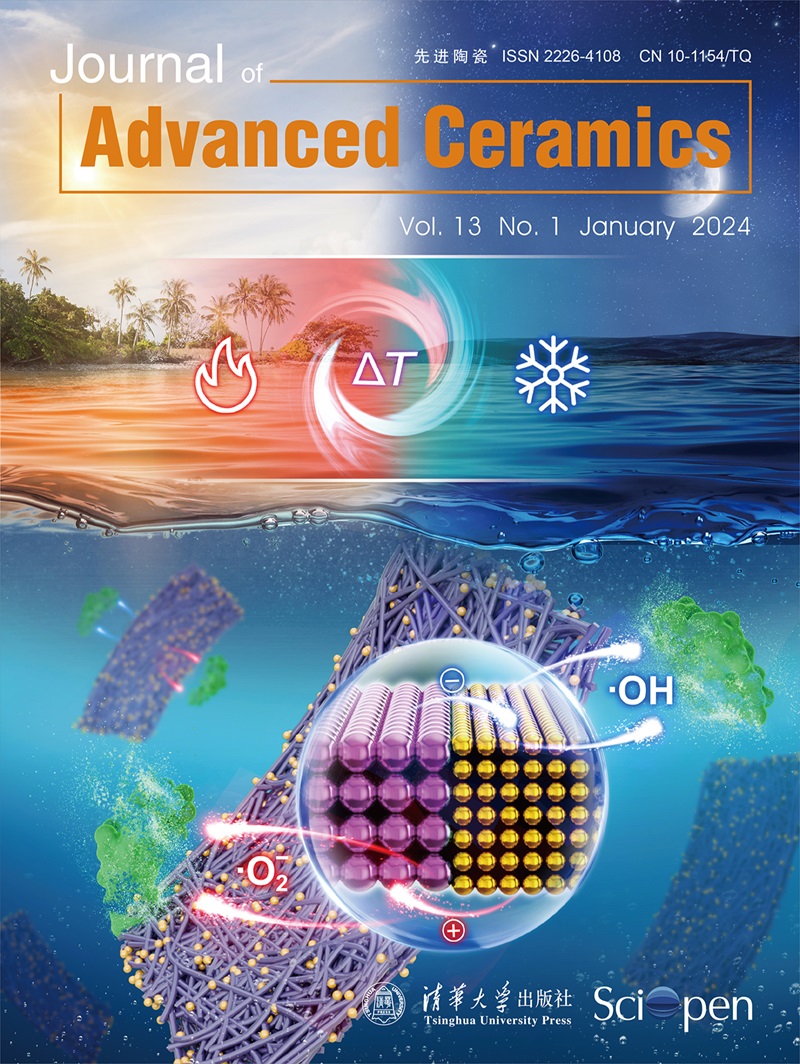原位生成和烧结氮化硼纳米片形成的一维氮化硼带增强了纳米纤化纤维素膜的导热性
IF 16.6
1区 材料科学
Q1 MATERIALS SCIENCE, CERAMICS
引用次数: 0
摘要
现代电子器件的快速小型化和高集成化,对具有高导热性的聚合物基热管理材料的需求日益增加。氮化硼纳米片由于具有极高的固有热导率而被广泛用作导热填料。然而,BNNS横向尺寸小,界面键合弱,只能通过物理重叠形成导热网络,导致界面热阻高。为了解决这一问题,本研究提出了一种基于界面工程的创新策略。通过原位生成和烧结,采用碳热还原氮化法成功合成了高纵横比氮化硼带(BNb)。BNb表面显示出大量小尺寸BNNS的烧结,这正好解决了BNNS之间界面结合弱的问题。在此基础上,将合成的BNb与纳米纤原纤维素(NFC)结合,通过简单的真空过滤工艺制备NFC/BNb复合膜。由于BNb水平取向排列形成的导热网络及其独特的形态优势,NFC/BNb薄膜的面内导热系数显著高于NFC/BNNS薄膜,填充分数为20 wt%时,其最高导热系数为19.119 W·m-1·K-1。此外,NFC/BNb薄膜还表现出优异的热稳定性、机械强度、柔韧性和电绝缘性能,表明所设计的BNb填料在热管理领域具有重要的应用潜力。本文章由计算机程序翻译,如有差异,请以英文原文为准。
Enhancing the thermal conductivity of nanofibrillated cellulose films with 1D BN belts formed by in-situ generation and sintering of BN nanosheets
The rapid miniaturization and high integration of modern electronic devices have brought an increasing demand for polymer-based thermal management materials with higher thermal conductivity. Boron nitride nanosheets (BNNS) have been widely used as thermally conductive fillers benefiting from the extremely high intrinsic thermal conductivity. However, the small lateral size and weak interface bonding of BNNS enabled them to only form thermally conductive networks through physical overlap, resulting in high interfacial thermal resistance. To address this issue, an innovative strategy based on interface engineering was proposed in this study. High-aspect-ratio boron nitride belts (BNb) were successfully synthesized by carbon thermal reduction nitridation method through the in-situ generation and sintering of BNNS. The surface of BNb showed the sintering of numerous smaller-sized BNNS, which precisely addresses the issue of weak interfacial bonding between BNNS. On this basis, the as-synthesized BNb were combined with nano-fibrillated cellulose (NFC) to prepare NFC/BNb composite films through a facile vacuum filtration process. Due to the thermally conductive network formed by the horizontal oriented arrangement of BNb and their particular morphological advantages, the NFC/BNb films demonstrated significantly higher in-plane thermal conductivity than that of NFC/BNNS films, achieving a highest value of 19.119 W·m-1·K-1 at a 20 wt% filling fraction. In addition, the NFC/BNb films also exhibited superior thermal stability, mechanical strength, flexibility and electrical insulation performance, suggesting the significant application potential of the designed BNb fillers in the thermal management field.
求助全文
通过发布文献求助,成功后即可免费获取论文全文。
去求助
来源期刊

Journal of Advanced Ceramics
MATERIALS SCIENCE, CERAMICS-
CiteScore
21.00
自引率
10.70%
发文量
290
审稿时长
14 days
期刊介绍:
Journal of Advanced Ceramics is a single-blind peer-reviewed, open access international journal published on behalf of the State Key Laboratory of New Ceramics and Fine Processing (Tsinghua University, China) and the Advanced Ceramics Division of the Chinese Ceramic Society.
Journal of Advanced Ceramics provides a forum for publishing original research papers, rapid communications, and commissioned reviews relating to advanced ceramic materials in the forms of particulates, dense or porous bodies, thin/thick films or coatings and laminated, graded and composite structures.
 求助内容:
求助内容: 应助结果提醒方式:
应助结果提醒方式:


